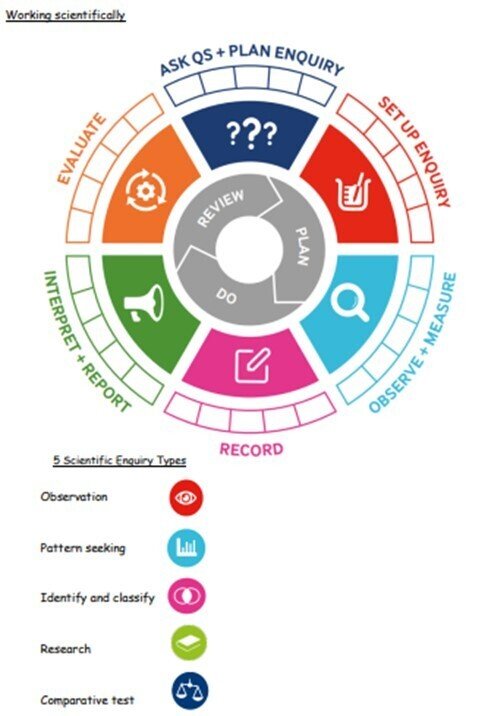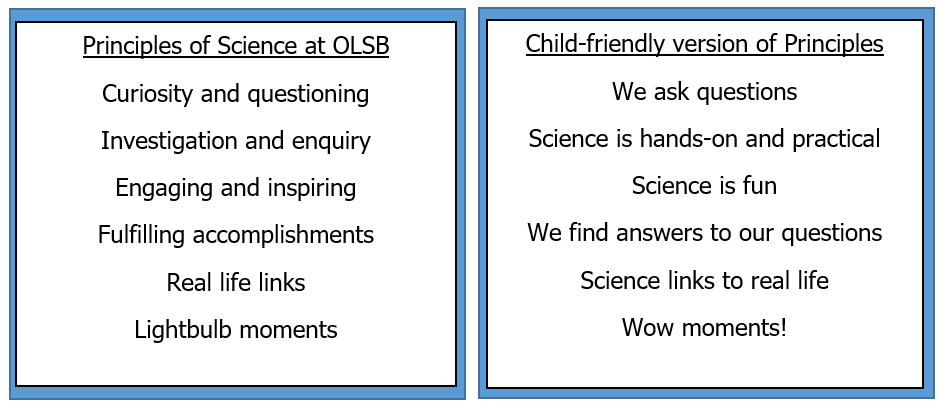Science
Science knowledge is the key that unlocks the wonders of the world. In our primary school, we ignite young minds with the power of scientific curiosity, empowering them to question, explore, and discover the marvels that shape our universe
Welcome to Our Lady and St Brendan's primary school science page! At Our Lady and St Brendan's, we believe that science education is an essential component of a well-rounded curriculum. We aim to foster curiosity, critical thinking, and scientific skills in our pupils, preparing them for a lifetime of enquiry and exploration
Science Curriculum Intent
In our rapidly evolving world, science is vital. Science stimulates and excites pupils’ curiosity about phenomena and events in the world around them. It also satisfies their curiosity with knowledge; because science links direct practical experience with ideas, it can engage learners at many levels. Scientific method is about developing and evaluating explanations through experimental evidence and modelling. We strive to promote the love of learning science and for children to understand and be curious about the science within their everyday lives. We place value on the importance of an investigative approach through regular 'hands on' experiences wherever possible. It is our intention that by the end of each Key Stage, each child will understand a variety of scientific concepts and be able to confidently discuss them. We aim for all children to work scientifically during lessons and work collaboratively investigating different concepts and ideas.
Key Documents
-
Progression in Scientific Enquiry Skills
download_for_offline
download_for_offlineProgression in Scientific Enquiry Skills
- Science Knowledge Progression download_for_offline
download_for_offlineScience Knowledge Progression
- Science LTP download_for_offline
↑download_for_offlineScience LTP
- Science Oracy download_for_offline
download_for_offlineScience Oracy
- Science Vocabulary Progression download_for_offline
download_for_offlineScience Vocabulary Progression
- Science Week Letter download_for_offline
download_for_offlineScience Week Letter
Science Curriculum Overview
At Our Lady and St. Brendan's Primary School, our intent is to foster a love for science and provide students with a solid foundation in scientific knowledge and skills. We aim to develop their curiosity, critical thinking abilities, and scientific inquiry skills through engaging and hands-on experiences. Our science curriculum is designed to be inclusive, accessible, and aligned with national standards, ensuring all students have the opportunity to excel in their scientific learning journey.
Implementation
1. Integrated Approach: We believe in integrating science with other subjects to create meaningful connections and enhance students' overall understanding. Our science lessons will incorporate elements of mathematics, English and technology to provide a holistic learning experience.
2. Hands-on Experiments: We value experiential learning, and practical experiments form a crucial part of our curriculum. Pupils will actively participate in various experiments, making observations, forming hypotheses, and analysing data. These activities will encourage them to think critically, develop problem-solving skills, and understand scientific concepts through real-world applications.
3. School trips and Outdoor Education: We recognise the importance of real-world experiences in science education. Regular school trips and outdoor education opportunities will be organised to explore the natural environment, ecosystems, and local scientific institutions. These experiences will enable pupils to connect classroom learning with the world around them.
4. Inquiry-Based Learning: We promote inquiry-based learning, where students are encouraged to ask questions, investigate, and seek answers. Teachers will facilitate open-ended discussions, encourage group projects, and guide students in conducting independent research. This approach will nurture their curiosity, creativity, and ability to apply scientific methods.
5. Technology Integration: We embrace technology as a powerful tool for scientific exploration. Students will have access to digital resources, educational software, and online platforms to enhance their learning experience. They will learn to use technology for data collection, analysis, and presentation of their findings, preparing them for the digital age.
6. Assessment and Feedback: We believe in continuous assessment and feedback to monitor pupils' progress and provide individualised support. Assessment methods will include practical experiments, projects, quizzes, and presentations. Teachers will provide constructive feedback to guide students in their scientific growth.
By implementing this comprehensive science curriculum, we aim to ignite a passion for science in our students, nurture their scientific thinking skills, and prepare them for future scientific pursuits. We are committed to creating an engaging and inclusive learning environment where every child can thrive and develop a lifelong love for science.Science Curriculum Impact
Assessing pupils' progress and the impact of our science curriculum is crucial to ensure that learning objectives are met. We employ a range of assessment strategies to gauge pupils' understanding and track their progress over time.
Formative assessments, such as teacher observations, questioning, and feedback during lessons, provide valuable insights into individual and class-wide understanding. This information helps us tailor our teaching to address any misconceptions and ensure pupils' learning needs are met effectively.
We also use summative assessments, including quizzes, written tasks, and practical assessments, to evaluate pupils' knowledge and skills at specific points in their learning journey. These assessments enable us to monitor progress, identify areas for improvement, and celebrate achievements.
Furthermore, we strive to develop pupils' scientific literacy beyond the classroom. We encourage them to present their findings, participate in science competitions, and engage in scientific discussions with their peers and families. These opportunities enhance their confidence, communication skills, and overall enthusiasm for science.
References from the Education Endowment Foundation (EEF) support our approach to science education and assessment. The EEF provides valuable research and evidence-based recommendations, ensuring our practices align with the latest educational insights and best practices.
At Our Lady and St Brendan's, we are committed to providing a high-quality science education that empowers our pupils to become curious, thinkers, and lifelong learners. We achieved the PSQM in 2022 and believe that by nurturing their scientific skills and knowledge, we are preparing them for a world where science plays an increasingly significant role.
Please feel free to explore our website for more information on our science curriculum, exciting experiments, and upcoming science-related events.1. Observation:
Observation serves as the starting point for scientific exploration. At our school, we emphasise the power of keen observation skills. Pupils are encouraged to engage their senses and carefully observe the world around them. Through structured activities such as nature walks, experiments, and school trips, pupils develop the ability to gather data, identify patterns, and formulate meaningful questions that drive their scientific inquiries.
2. Pattern Seeking:
Pattern seeking empowers pupils to recognise regularities, trends, and relationships within collected data. By identifying patterns, students can draw conclusions and make predictions about various phenomena. Our school incorporates pattern-seeking activities into the curriculum, allowing pupils to analyse data sets, explore graphical representations, and unravel hidden patterns. This inquiry type enhances critical thinking skills and encourages pupils to search for deeper explanations.
3. Identification and Classification:
Identification and classification involve categorising objects or organisms based on their characteristics. At our school, students learn to observe and analyse the unique features of organisms, minerals, or other natural elements. This inquiry type fosters an understanding of diversity, promotes attention to detail, and hones pupils abilities to distinguish between different categories.
4. Research:
Research is a vital component of scientific enquiry. Our school encourages pupils to explore scientific literature, online resources, and credible sources to deepen their understanding of specific topics. By engaging in research activities, students learn to access and evaluate information critically, make connections, and synthesise knowledge. This inquiry type equips students with essential research skills, promotes academic integrity, and fosters a broader understanding of scientific concepts.
5. Comparative Tests:
Comparative tests involve setting up controlled experiments to compare different variables or conditions. At our school, students engage in comparative tests to investigate cause-and-effect relationships, test hypotheses, and draw evidence-based conclusions. Through carefully designed experiments, pupils learn to manipulate variables, collect data, analyse results, and communicate their findings. This inquiry type nurtures analytical thinking, cultivates problem-solving abilities, and encourages students to think like scientists.
Conclusion:
By utilising the five scientific inquiry types - observation, pattern seeking, identification and classification, research, and comparative tests - our school provides a comprehensive and engaging scientific learning experience. These inquiry types promote active exploration, critical thinking, and a deep appreciation for the wonders of the natural world. By fostering a spirit of inquiry, we empower our students to become lifelong learners, equipped with the skills to navigate and contribute to the ever-evolving realm of scientific discovery.In each science unit of work pupils have a Learning Map which details the working scientifically opportunities and the substantive and disciplinary knowledge that will be developed. Below are some examples of the Learning Maps our pupils use:
Before a unit of work, pupils complete a pre-unit quiz to ensure that they remember the content they have learnt previously in this strand of science. Below are some examples of these:
Each lesson has an enquiry question which the pupils are then able to answer by the end of each lesson. Some examples of the lesson sequences below:
The progression in Working Scientifically is mapped out from EYFS through to Upper Key Stage 2
Working Scientifically in EYFS
Working Scientifically in KS1
Working Scientifically in LKS
Working Scientifically in UKS2
Inclusion statement
Subject leader and class teachers ensure that the curriculum is accessible to all, especially SEND and disadvantaged pupils. Teachers adapt their teaching to cater for the needs of SEND pupils and disadvantages pupils. Disadvantaged pupils always have the opportunity to take part in science-related trips and experiences through use of Pupil Premium funding. We have high aspirations for all pupils and staff use scaffolding effectively to help all pupils to access the Science curriculum. This includes considering their learning styles (VAK), time given to complete activities, additional resources and activities for vocabulary development, use of teaching staff, grouping, seating, scribing, reading and use of ICT.
Higher attaining pupils in science are considered by staff as part of their planning. The curriculum is ambitious in its content and expectations of pupils. When it is appropriate to differentiate learning support progress of higher ability pupils, pupils are targeted with more demanding questions and given next steps that encourage them to enquire in a deeper way. This may include using additional scientific vocabulary, developing higher order thinking skills and challenging pupils to work scientifically in a more independent way.
Inclusion is also considered in assessment, when carrying out ongoing assessments as part of teaching and during summative assessment activities. Activities are designed and implemented to give children the opportunity to show everything they know without being limited by things such as their writing ability. Assessment in Science at Our lady and St Brendan’s acknowledges that children often know more about science than they are able to record in written form. We believe that children should be given the opportunity to share what they know about science whatever their literacy levels and that teacher assessment reflects this understanding.
- Science Knowledge Progression download_for_offline





















